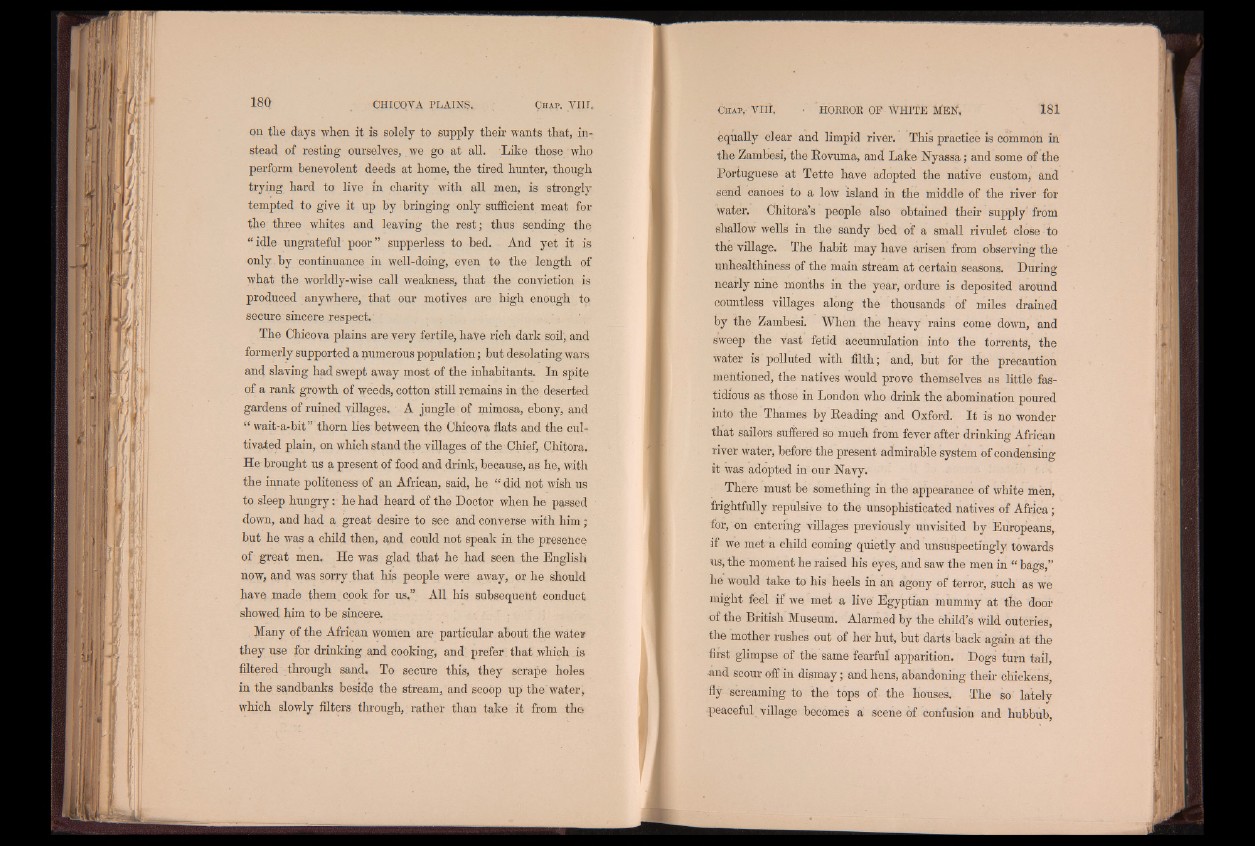
on the days when it is solely to supply their wants that, instead
of resting ourselves, we go at all. Like those who
perform benevolent deeds at home, the tired hunter, though
trying hard to live m charity with all men, is strongly
tempted to give it up by bringing only sufficient meat for
the three whites and leaving the rest; thus sending the
“ idle ungrateful poor” supperless to bed. And yet it is
only by continuance in well-doing, even to the length of
what the worldly-wise call weakness, that the conviction is
produced anywhere, that our motives are high enough to
secure sincere respect.
The Chicova plains are very fertile, have rich dark soil, and
formerly supported a numerous population; but desolating wars
and slaving had swept away most of the inhabitants. In spite
of a rank growth of weeds, cotton still remains in the deserted
gardens of ruined villages, A jungle of mimosa, ebony, and
“ wait-a-bit” thorn lies between the Chicova flats and the cultivated
plain, on which stand the villages of the Chief, Chitora.
He brought us a present of food and drink, because, as he, with
the innate politeness of an African, said, he “ did not wish us
to sleep hungry: he had heard of the Doctor when he passed
down, and had a great desire to see and converse with him;
but he was a child then, and could not speak in the presence
of great men. He was glad that he had seen the English
now, and was sorry that his people were away, or he should
have made them cook for us,” AH his subsequent conduct
showed him to be sincere.
Many of the African women are particular about the water
they use for drinking and cooking, and prefer that which is
filtered through sand, To secure this, they scrape holes
in the sandbanks beside the stream, and scoop up the water,
which slowly filters through, rather than take it from tha
equally clear and limpid river. This practice is Common in
the Zambesi, the Hovuma, and Lake Nyassa ; and some of the
Portuguese at Tette have adopted the native custom, and
send canoes to a low island in the middle of the river for
water, Chitora’s people also obtained their supply from
shallow wells in the sandy bed of a small rivulet close to
the village. The habit may have arisen from observing the
unhealthiness of the main stream at certain seasons. During
nearly nine months in the year, ordure is deposited around
countless villages along the thousands of miles drained
by the Zambesi. When the heavy rains come down, and
sweep the vast fetid accumulation into the torrents, the
water is polluted with filth; and, but for the precaution
mentioned, the natives would prove themselves as little fastidious
as those in London who drink the abomination poured
into the Thames by Reading and Oxford. I t is no wonder
that sailors suffered so much from fever after drinking African
river water, before the present admirable system of condensing
it was adopted in our Navy.
There must be something in the appearance of white men,
frightfully repulsive to the unsophisticated natives of Africa ;
for, on entering villages previously unvisited by Europeans,
if we met a child coming quietly and unsuspectingly towards
us, the moment he raised his eyes, and saw the men in “ bags,”
he would take to his heels in an agony of terror, such as we
might feel if we met a live Egyptian mummy at the door
of the British Museum. Alarmed by the child’s wild outcries,
the mother rushes out of her hut, but darts back again at the
first glimpse of the same fe'arful apparition. Dogs turn tail,
•and scour off in dismay ; and hens, abandoning their chickens,
fly screaming to the tops of the houses. The so lately
-peaceful village becomes a scene of confusion and hubbub,